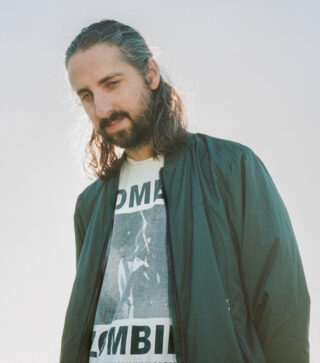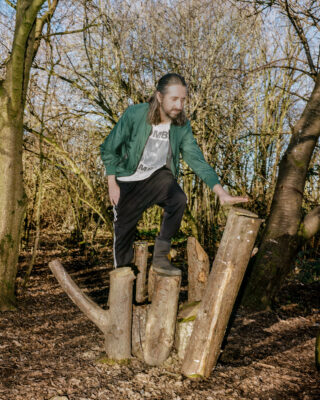James Holden: “Music is an activity, not a product – it’s a social thing”
From teenage raves in rural Leicestershire to a new kind of "dancing music" without the need for a donk

From teenage raves in rural Leicestershire to a new kind of "dancing music" without the need for a donk
“When I was a teenager, I was fully convinced I was going to buy an old army truck and just be a new-age traveller,” reminisces electronic producer-composer (and 43-year-old static homeowner) James Holden. With restrictive parents who prohibited Radio 1 and ITV at home, and inspired by the tales of free raves trickling through the morally panicked mid-’90s media that inadvertently made them sound like the most appealing adventures going, Holden became sure of his one true path. His mind was only further solidified when, aged 16, he started covertly going to hippie-run raves in community centres and forests in his native Leicestershire, long after the more headline-grabbing parties had been clamped down by John Major’s Tory government, but still where that culture endured.
“They were magic,” Holden remembers. “I mean, they weren’t ever as good as what I’d imagined in my head, because often the music was a bit shit and the DJ wasn’t very good at DJing, but they were still amazing: the vibe and the positivity was beautiful. You had space to dance, everyone was nice to everyone, everyone was looking after everyone, you felt like you were in a community, and those environments made the society.”
Of course, teenage dreams seldom come true, and Holden’s was scuppered only a few years later, after he wrote a whooshing prog house track called ‘Horizons’ in his university bedroom at the turn of the century. Picked up by a wheeler-dealer label owner and thrust into the hands of superstar DJs, the single catapulted Holden out of Midlands woodlands and into actual clubs.
“I was told that Nick Warren was going to play ‘Horizons’ at Turnmills, so we went down and it was literally the least fun experience,” Holden recalls of one of his first times at a corporate nightclub. “Like, this is a club? It’s horrible! It was nothing like I’d imagined. I’d grown up dancing in the second room of Leicester crustie hippie things, half-chill-out deep house things just waving my arms around, and then suddenly you’re in Turnmills with really aggro people and shitty music and bad sound.”
As a result of experiences such as this and other assorted anhedonic glamour (“The complete horse muck of being taken out for dinner and eating fucking foam with Nina Kraviz,” he offers, as another gleaming example), the rest of the 2000s found Holden gradually attempting to extract himself from clubland, starting with giving up DJing, self-releasing increasingly club-unfriendly records through his own label, Border Community, and forging collaborative links with experimental musicians. As a result, the most recent decade in his musical development has been a revelation: 2013’s The Inheritors now feels like a year-zero moment, with its welding of ecstatic jazz signifiers to analogue synth timbres to form something chaotic and beautiful, half-man-half-machine, and a record that then fed into ensemble playing with his quasi-improv band The Animal Spirits. Add work with the likes of experimental multi-instrumentalist Wacław Zimpel and percussionist Camilo Tirado, and suddenly we’re a long way – emotionally, physically, mentally, temporally – from Turnmills and trance.
“I’m so happy that I exited club culture, because it means I don’t have those traditions and value judgements and norms in my head when I’m writing anymore,” he explains, “and I can just write my concept of dancing music without the feeling that everyone’s expecting a donk!”


Why Holden’s early years – and his desire for delivery from donk domination – is important today, though, is because it feeds directly into the music he’s just made. He describes his new record, the trip-off-your-tongue Imagine This Is a High-Dimensional Space of All Possibilities, as “the record the teenage me wanted to make”. It’s full of that wide-eyed utopian–anarchist naivety and exhilaration he found at the community centre raves and, crucially, deliberately lacking much in the way of a drop.
“When I was first getting into dance music,” he explains, “I kept thinking the records were put together wrong: they’d have these beautiful melodies, and then suddenly in would come all these beats! It was always these beautiful melodic breakdowns followed by boring parpy beats, but I could’ve just lived in the breakdowns forever. For me, in dance music the rush comes from the melodies, whereas the drop is fleeting, you’re disappointed almost immediately afterwards, and there are no more feelings once the drop’s happened. I love texture and space, and as soon as you’ve got a big kick drum in there, you’ve killed that.”
And so it is that High-Dimensional Space is a nominally electronic record, but with precious little in common with a great deal of electronica: it’s a record that floats rather than hits, evokes rather than describes, full of potentials and paths untravelled, rendering it impressively moreish to listen to: there’s pulse and structure and propulsion from a start to an end – by no means is this ambient music – but tracks stay open-ended for almost their entire duration, rejecting obvious answers or compositional orthodoxy, simply becoming more detailed the more closely they’re examined, thus drawing in the listener.
Suddenly, the wordy title about multidimensionality makes sense, with the instruction of the record’s title rather revelatory after pressing play: “My music is all about the execution of a system,” he explains. “You set it up with a number of parameters, and it has a stable state, where it balances, and then it’s about nudging those parameters in different directions as it goes. So each song is a description of one journey through this parameter space that I’ve built, but there are all these millions of other journeys and dimensions that could’ve been taken, or are hinted at being taken. And that’s also what life is, so it feels like quite a rich metaphor for existence.”
Therein perhaps lies the record’s greatest appeal, and Holden’s real superpower: by resisting any didactic form that aims at specifics or certainties, and by constantly implying a foundationless chaos lurking one wrong turn away, his musical approximation of life assumes a strangely affecting veracity. This isn’t music that’s telling the story of a life, but instead it’s simply holding up an audio mirror to the listener, acting as a sort of abstract metonym for life itself. It also, almost incidentally, just sounds beautiful.
The irony is, however, that High-Dimensional Space’s origins came about during a particularly bleak Covid lockdown when Holden’s dog was dying of cancer and he was plunged into a period of isolation. In a sense, this record is very much “about” those times, he says. But instead of trying to tell the story, like a dance-music equivalent of every country song about a passed pooch, Holden mined the feeling rather than the event, and explains why it was now, a quarter-century on from those teenage rave dreams, that he’s chosen to go back: “That period of being locked up was quite evocative of my childhood, which was quite locked down,” he recalls, with nicely accidental poetry. “So it definitely wasn’t a coincidence that I was referencing those feelings, and thinking about the kind of music I was secretly listening to back then, around the time of lockdown.”
There’s a sense, then, that Imagine This Is a High-Dimensional Space of All Possibilities may indeed be the record that a teenage Holden always dreamed of making, but also one he only became able to create after taking this 25-year-long musical journey, that long-way-round of creative self-discovery full of prog trance misadventure and computer-music revelation, joyful collaboration and tantalising mis-imaginings of clubbing drawn in rural Leicestershire from the breathless reporting of the London weekly music press.
“That’s probably true,” concedes Holden. “Although at least today the kids have Boiler Room, so they can see first-hand that clubs are shit,” he laughs. I ask him, jokingly, how much he’d need to be paid to return to the big-room DJ booth, but he’s far more interested in the infinite possibilities of reproducing High-Dimensional Space live. “I’m actually working out the live set-up at the moment, and the software that I’ve written is really good for going off on one, so the songs have a lot of possibilities,” he says. “What I’m still not sure about is whether it’s going to drop.”
Realistically, I suggest, it’s unlikely, isn’t it? Holden agrees: “The most interesting sound in a record is obviously never the kick drum – ever. Even if a record is just the kick, the vinyl crackle is more interesting! The kick is just a marker – if you’ve heard music before, you know where the kick is going to be, so you don’t need to hear it to be able to dance to it.”
It was telling, earlier in our conversation, that Holden referred to the music he made as “dancing music”, not just dance music. That implies an activity, I suggest, and also a benevolence. “Yes! Music is an activity, not a product. It’s a social thing, and that’s why it’s evolved – it’s glue for people.
“Dancing music is anything with a pulse that hypnotises and lifts you off the ground,” he adds. In Holden’s teenage world, full of boundless utopian adventure and exhilarating radical freedom, there’s a sense that that hypnosis would ideally float on forever.